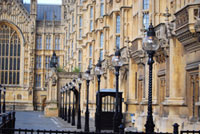
What role should the Courts have in maintaining our democracy?
The summer of 2009 may be remembered as the point in time when trust in Parliament reached an all-time low. The understandable anger at the endless revelations about MP’s expenses has seemed to threaten our entire system of government. What has made matters worse is the apparent lack of real accountability for MPs.
Unfortunately, the fact of the matter is that most MPs did act within the rules and, strictly speaking, they have done nothing illegal. Morally speaking, their behaviour is unacceptable. Apart from electing them out of office, how can it be right that they are accountable to no one? What is to stop them from increasing their salaries or making more unfair and immoral rules about what expenses they can claim? In theory, nothing can stop them from doing this. Parliament can make any law that it chooses, and no body, including the courts, can question the validity of its acts. This is known as the concept of Parliamentary sovereignty, which was first conceived by A V Dicey in Law of the Constitution (1959). He stated that: -
“Parliament…. has, under the English constitution, the right to make or unmake any law whatever; and, further, that no person or body recognised by the law as having a right to override or set aside the legislation of Parliament.”
With fundamental questions about the ability of MPs to govern themselves, it is the right time to ask whether the traditional notion of Parliamentary sovereignty should be officially reformed. In other democratic systems, the Courts can declare law “unconstitutional”. Unfortunately, the UK does not have an official constitution, but this does not mean a similar system could not be used here. It has actually been the case that for many years the Courts have challenged the supreme power of Parliament.
One of the most recent examples was a ruling last year by High Court judge Mr Justice Collins. Justice Collins stated that the government policy on asylum breached the European Convention on Human Rights and was effectively “flawed”. The Home secretary David Blunkett was furious, but is it wrong that government should be accountable for policies that are “illegal”?
Depending on your viewpoint, the Courts either have a vital role to shine a light into the dark corners of decision-making or they are unelected individuals who are taking over the role (and sovereignty) of Parliament.
The formal process which the Courts follow when questioning the lawfulness of a public body’s actions is known as Judicial Review. Since the 1980s there has been a four-fold increase in the number of cases brought. This rapid expansion in the number of cases brought for judicial review indicates that the need for judicial scrutiny of government decisions is greater than ever.
With the advent of a new Supreme Court in October of this year and the disrepute that MPs have brought upon themselves, we may find that the new Court will be even more independent than the current House of Lords. We can only hope that with the increased threat of judicial intervention, MPs will behave as the “honourable” gentlemen they claim to be. Further, the government, as a whole, might be more accountable because of a more proactive involvement by the Courts.

